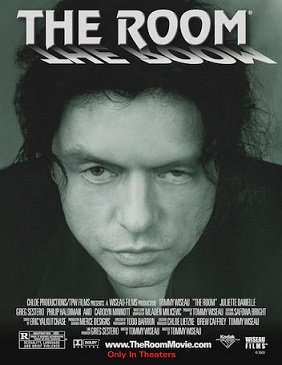 |
| Theatrical Poster for The Room |
I realize I'm late to the party, but I
recently had the “pleasure” of watching The Room in a
double feature with The Disaster Artist, the adaptation of
actor Greg Sestero's book about the making of the infamous film.
Since The Room came out and
became a cult hit (in spite of itself), many screenwriters have
asked, “How does a piece of garbage like that get made, when I
can't even get anyone to look at my scripts?”
The answer is simple. The Room was nothing short of a vanity project for
writer/director/producer/star Tommy Wiseau. He reportedly poured more
than $6 million into the project in 2002, which comes out to nearly
$8.5 million in 2018 dollars.
Aside from the amateurish acting, the
inconsistent direction, and the excruciating love scenes, one of the
hallmarks of The Room was its poor script. This attempt at a
screenplay featured characters whose relationships were unclear,
characters who appeared for the first time past the halfway point,
and storylines that were picked up and dropped with no explanation.
If The Room was a train wreck,
then The Disaster Artist shows how the engineer and the driver
got together to drive the train straight off the rails. The film
shows Tommy Wiseau (James Franco) as a modern-day Don Quixote, with
Sestero (Dave Franco) as his Sancho Panza, both of them tilting at
the windmill known as “Hollywood Stardom”.
Where The Room is excruciating to watch, The Disaster Artist is oddly inspiring. It shows how someone
with no talent, no experience, and a complete unwillingness to work
with others can succeed if they're stubborn enough. (Insert
contemporary political reference here.)
In its own way, The Disaster Artist parallels one of the finest films of all time, and my personal
favorite to use as a teaching tool: Rocky. In both films, a
lead character with an unrecognizable accent attempts to reach the
heights of their profession, assembles a rag-tag crew, and achieves
their dreams, but not in the way that they had anticipated.
The success of Rocky, the cult
status of The Room, and the Academy Award-nominated screenplay
of The Disaster Artist shows that audiences love a great
underdog story. The lesson to take away from the successes of these
three films is simple: Don't be afraid to be terrible.
Your ideas suck. Your writing is
unreadable. Your dialogue sounds like it's coming from an alien who's
just recently learned the concept of social interaction. Your
characters have the depth of wet tissue paper. Your story has the
frenetic pace of a tranquilized sloth.
Your first draft will suck. Get used to
it.
Your rewrites will feel like a
never-ending root canal in your brain. Them's the breaks.
Every reader will find something new
and different to hate about your script. Just accept it.
You will hate your script, your
characters, and your life. You will become a miserable excuse for a
human being.
How's that for motivation?
As the old workplace poster says, “You
don't have to be crazy to work here, but it helps.”
As a writer, you have to be crazy just
to get started. You have imaginary conversations in your head with
people who don't exist. Not only that, you expect companies to pay
millions of dollars and employ dozens of people to take your writing
from the page to the screen. Then, you expect people to pay up to $15
a ticket to watch what you wrote. If that's not crazy, then what is?
Was Tommy Wiseau crazy? By nearly every
objective measure, he was, to use the clinical terms, nuttier than a
fruitcake. But did he succeed? He made his movie, his way, with his
script. A decade and a half later, people are still watching it,
talking about it, and (GASP!) blogging about it.
So enjoy writing your terrible script.
Have fun pounding your pile of garbage into something resembling a
usable screenplay. Make party hats out of those harsh coverage
reports and form rejection letters.
Tell your story. Write your script. Get
it made. Tilt at those windmills.
Because you're the only one who can.
*****
If you need help in improving your
“terrible” script, Story Into Screenplay can help. We offer
script consultations, coverage reports, and expert advice on how to
hone your screenplay. Contact us at
storyintoscreenplayblog[at]gmail[dot]com, or send us a message on our
Facebook page.
*****
Gerald Hanks of Story Into Screenplay
will be appearing at the Comicpalooza sci-fi convention again this
year. The convention will be held at the George R. Brown Convention
Center in Houston, Texas, from Friday, May 25, to Sunday, May 27.
Gerald will be on two panels:
Saturday 5/26
1:30 - 2:30pm
Horror for the 21st Century: Film and
Literature
Sunday 5/27
3:00 - 4:00pm
No Money, No Problem - Screenwriting
for Low Budget Filmmaking
We'll be posting more details and
panels as they become available.
No comments:
Post a Comment